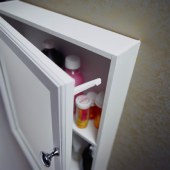
THURSDAY, July 29 (HealthDay News) — Evamist, a drug used to reduce menopause-related hot flashes in women, may harm children and pets who have skin contact with the drug, the U.S. Food and Drug Administration said Thursday.
The product, which is sprayed on the skin between the elbow and wrist and on the inside of the forearm, contains an estrogen hormone called estradiol. Evamist was approved for use in the United States in 2007.
Since then, the FDA has received eight reports of adverse events in children aged 3 to 5 who were unintentionally exposed to the drug. The adverse events include: premature puberty, nipple swelling and breast development in females; and breast enlargement in males.
In addition, the FDA’s Center for Veterinary Medicine has received two reports of dogs being exposed to Evamist. This may lead to mammary/nipple enlargement and swelling of the vulva.
“Women using Evamist need to be aware of the potential risks to children who come into contact with the area of skin where this drug is applied,” Dr. Julie Beitz, director of the FDA’s Office of Drug Evaluation, said in an agency news release.
“It is important that people know to keep both children and pets away from the product to minimize exposure,” she added.
Women who use Evamist should prevent children from touching the area of the arm where the product is sprayed. If a child does touch this area, wash the child’s skin with soap and water as soon as possible, the FDA advised.
Do not let pets lick or touch the area where Evamist is applied. Small pets may be especially sensitive to the estrogen in the product.
If it’s difficult to prevent children or pets from direct contact with areas of the skin where Evamist is applied, women should wear a garment that covers the area.
Currently, it is not known whether unintended exposure can occur with other estrogen products that are applied to the skin, the FDA said.
Any side effects believed to be caused by Evamist should be reported to FDA’s MedWatch Adverse Reporting program at 800-332-1088.
More information
The National Women’s Health Information Center has more about menopause.

